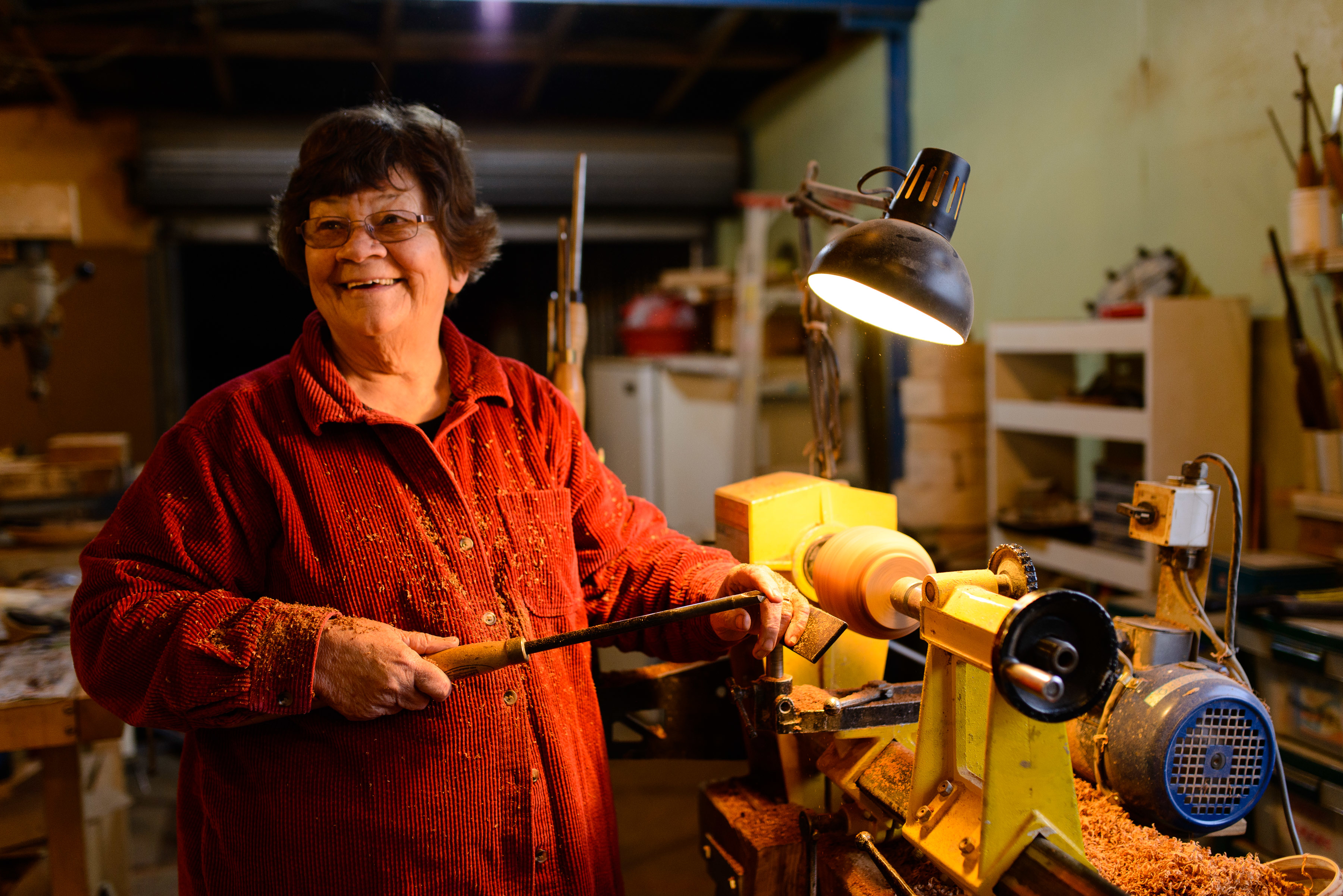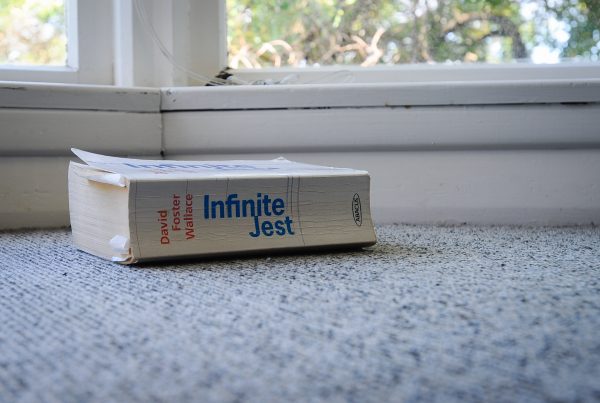
She has written — at last count — more than 40 picture books, nine novels for adults and young adults, and a memoir. She is the author of over 600 short stories that are used throughout the world by reading teachers. Cowley is published in dozens of languages and has received literary awards by the score. In New Zealand, she holds an honorary doctorate from Massey University and has been awarded — in no particular order — the New Zealand Suffrage Centennial Medal and the Prime Minister’s Award for Literary Achievement. In 2005, she was made a Dame Companion of the New Zealand Order of Merit, and in June this year she won yet another New Zealand Post Book Award, this time the Junior Fiction Prize in the Children’s section for Dunger (published by Gecko Press). Even by New Zealand standards, Cowley is a marvel.
“Some years ago I was at Grand Rapids University. I’d been doing a talk there to the education faculty, and a professor spoke to me after the talk and said he wanted to come to New Zealand. He wanted to see what made New Zealand so different.
And I said, ‘What do you mean different?’
And he 
Now my reaction was denial. I thought, ‘Nah.’ But then I went away and thought about it some more. It’s probably near enough to true — there won’t be too many omissions. Medicine, opera, music… sports, obviously. And y’know what, he’s right. Seven billion people in the world, and yet this little gang of four-and-a-half million are consistently producing world-beaters. And he wanted to know what we were doing differently down here.
Do you have an answer?
“Hah! Not really. It’s good to think about though, eh?”
We both laugh at this. And then, as she is wont to do, Cowley tires of the levity, and has a serious crack at an answer.
“It’s to do with the pioneer spirit definitely though, eh? I know that ‘number 8 wire’ thing is overused, but we are still a nation of people who like to have a go themselves, who like to build their own lives. I’d hate to see us lose that.”
We talk for a while here about New Zealand’s own imagining of itself. Of how the fullest flowering of the pioneer spirit and the icon of the ‘good keen man’ were surely in the 1940s, 1950s and the early 1960s, and yet this was the exact time when our nation of alleged rugged individualists was at its most utterly dependent on the largesse and the purchasing power of mother England. From this distance, those decades also look like a time when any New Zealander who wanted to write a book or paint a picture that did anything other than buy into and exult the national myth was better off getting on a boat and sailing to London.
If you don’t know this already, Cowley is a wonderfully good writer, easy to read, hugely strong on character, events and place. Before setting out to meet her, I made sure to go back and reacquaint myself with a couple of her children’s books — Snake and Lizard especially — but since driving back over the hill from her home in Featherston last week, I’ve had my nose buried in a couple of her young adult and grown-up novels. Speed of Light is sitting next to me as I scrawl this down.
“The School Journals had writers who were mainly men. James K. Baxter was a frequent contributor. In fact, he was an editor at one stage… the School Journal was almost a hothouse for writers.”
Cowley published her first children’s book after years of contributing stories to the journals. The Duck in the Gun was published in America, in 1969. It is written for children, but is a regarded as an anti-war classic, inspired by the horrors of Vietnam.
“I had a cousin who did two terms over in Vietnam and he used to write letters of what was happening and I thought he was making up the stories. The fact that they couldn’t take prisoners in the jungle so they used to cut off their ears to prove their kills. I thought he made that up, and it wasn’t — it was true. When I discovered it was true, that’s when I wrote The Duck in the Gun. It’s a light-hearted anti-war book but it’s still got a serious message in it, it’s a picture book.”
Cowley’s Featherston house is so nondescript as to defy description. Sitting in my car outside, I called to double-check the address. I’d been expecting — I don’t know — a twee little cottage with a rose arch and a gnome perhaps. But not this resolutely ordinary aluminium-joineried working-class bungalow.
At the door, Cowley beamed at Mark, the photographer, and me. She seemed genuinely delighted to see us, as though we weren’t taking her away from her work, as though she doesn’t get enough media attention, as though she really wants or needs another brace of men traipsing through her lounge with their recorders and their cameras and their questions.
We sat down over — home-made — cakes and tea, and for the next hour I had to continually remind myself that this kind, funny, gracious woman is also a world-renowned children’s author, writer of young adult and adult novels, campaigner for literacy and general thorn in the side of anyone — authority figures especially — who doesn’t understand the importance of reading, and of continually, ceaselessly imparting the importance of good writing and active reading as an absolute foundation of civilisation.
“I started writing for my oldest son, Edward, who wasn’t reading what the other three children were reading, so I wrote stories for him and his teacher. You know they had the old Janet and John books in those days, and all this other English stuff. Some of it very good, A.A. Milne and Kenneth Graham… but there was nothing about bush and paddocks. It was all woods and spinnies and copses — you know, those unfamiliar landscapes.
“[His teacher] said there’s no reason why any child should want to read these, and she advised me to write for him. Well I wrote for him, for other children, worked one to one, and teachers wanted some of these stories published. But no one had ever heard of little 16-page books in New Zealand, so we couldn’t get a publisher. We (my late husband Malcolm and I) were going to publish them ourselves. But then my editor, June Malcer, she said, ‘I’ve got some retold folk tales with a young publisher in Auckland.’ And that was Wendy Pye.”
It’s unlikely that there is anyone in New Zealand who knows more about writing for children than Joy Cowley:
“My own rule is I write for children as I write for adults. I do my best, but I stay within the child’s experience of life, the child’s experience of language. But writing for children is probably more difficult than writing for adults, in that you have to meet a certain age level. For example, humour is quite important in early reading. It’s a very simple formula, but five-year-olds laugh at different things from seven-year-olds. You know they like slapstick humour but when you’re seven you want something more sophisticated — puns and jokes. You need to write for a specific age level and that, for new writers, is something they sometimes miss. They’ve got this idea of writing a story for children, and I say what age? And they say, oh um, from five to twelve. [Laughs] No, that doesn’t work, it’s got to be specific. I tell them to write for one child you know very well and you’ll probably get the level right.
“I work with children all the time, so I know the ages and levels. But I still listen to their conversations though, because that changes. The world of childhood doesn’t ever change, it’s the same from country to country, but the cultural fads and fashions, or whatever you like, do change.
“I tell children that ever since the beginning of the universe there’s never been another person exactly like you and there never will be again. And just give children a sense of self-worth and then you can add on family values and extend them, and then social values, but you can’t put social values onto a child who is still unformed, or a child who is still strictly under parental control — they have no meaning.
“In New Zealand I see children becoming confident speakers; in other words, they’re standing on their own feet. But y’know, in my generation it was still children should be seen and not heard. And we expected adults to speak for us, and very few children had their own opinions. But children do, and I’m so pleased to see that.
“I get lots of letters from children, of course, and have conversations with children, and they hold their own. They’ve got their own ideas, their own opinions, and that has to be encouraged.”
After we have talked for perhaps an hour and have covered Cowley’s career, her family (four adult children, 13 grandchildren) and the move to Featherston —(Cowley and her husband Terry Coles moved here after living in the Marlborough Sounds and in Wellington; Terry’s health isn’t the best and Featherston is the right mix of quietness and proximity), she invites us to see her workshop.
About four years ago, at the age of 73, Cowley took up woodturning as a hobby. Her garage is equipped with a serious-looking lathe, shelves and walls full of wonderful traditional tools, and the floor is stacked with off-cuts of macrocarpa. Without waiting to be asked, she fires up the lathe and gets to work. Mark the photographer practically beams. So do I. I ask Joy about religion, because it seems to me to be the actual underlying theme of so much of her work, and much of our conversation today.
“Well, I just think that we’re spiritual beings on a human journey rather than the other way round, and religion gives us maps for a journey. But that’s just one set of maps. There are lots of different maps. And I think the journey is about being fully human. I quite like the Judaic view, that we live in only 10 percent of reality: knowing whatever we can see, hear, taste, touch, smell… that’s only 10 percent and the other 90 percent is a spiritual realm which is all around us. And the older we get and the more we fulfil our lives in unafraid living, the more we come in touch with that otherness. In Judaism they say you come very close to that 90 percent when you see and hear with the eyes of the heart. And I think that anyone in creative pursuits does come across something they might call amazing coincidence in their lives, that there is a feeling of being a part of something much larger. And I don’t think that any of the maps we’re given for the journey, actually are the journey. Life is the experience of the journey.”






